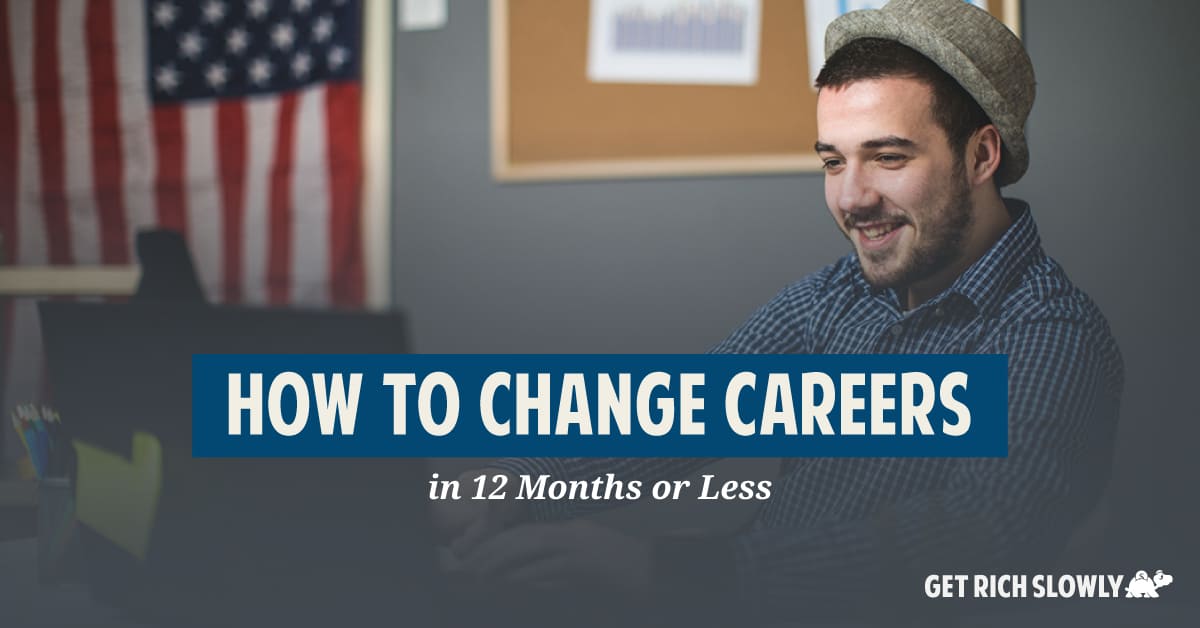How to change careers in 12 months (or less)

After spending a decade as a pastor, I realized in May of 2018 that I was ready to make a drastic career change…into personal finance education.
I’ve always loved to write, so I wanted to first see if I could actually make money writing about personal finance. But I made a commitment to myself. In one year’s time, I was going to have a day job where I helped people learn how to handle their money wisely. The question was just in what capacity.
So I set a deadline for myself. If I hadn’t figured out a way by May 2019 to make enough money as a freelance writer to pay the bills, I would get certified as a teacher and apply to be an economics teacher at local high schools.
Fast forward twelve months. This past May I did quit my day job. In one year’s time, I was able to create a full-time income in a career that I previously had no experience in.
How did I do it? More importantly, how can you turn your dream job into a reality as quickly as possible?
Give Yourself Permission to Make Mistakes
When I first decided that I wanted my day job to be in the personal finance space, I honestly had no idea what job I should pursue. Here are just a few of the options that I pondered:
- Getting my CFP certification so I could become a financial planner
- Becoming a financial coach
- Getting certified as an ACF accredited counselor
- Becoming a high school or college teacher
- Becoming a financial aid counselor
- Starting a personal finance blog
- Starting a podcast
- Starting a YouTube channel
Does it sound like I was just throwing spaghetti against the wall to see what would stick? Yeah, it felt that way too.
I was so frustrated that I couldn’t just “know” what my path was. There were many days that my head hurt just trying to consider all the options.
So how did I move forward? I just started experimenting with things and I told myself if it was perfectly fine if they didn’t pan out. Remember the financial coaching idea? Yeah, I paid way too much for a “financial coach training” course that ended up being a complete waste of money and time.
The blog idea? I tried that one out for size in May when I launched my website. And I naively thought that it could become my full-time income in no time at all.
I was wrong.
But before I wander too far down the trail of the “greatest hits” of my mistakes, let me get to the point. Believe it or not, I didn’t let those mistakes or miscalculations discourage me.
My general passion kept me grounded enough to push through difficulties deciding upon my specific job. I knew that I would eventually find my “niche” and I gave myself permission to choose some wrong doors before finding the right one.
And in the case of my blog, yes it didn’t end up being a money-maker for me as quickly as I assumed it could be. But the writing that I did for my own site was instrumental in helping me land writing clients later on.
Meet People
I know the saying is overused, but there’s a lot of truth to the saying: “It’s not what you know you, but it’s who you know.”
In my case, I wanted to break into the personal finance media field. I wanted to meet people who were already in that space.
I wasn’t sure how to do that. But I simply googled “personal finance blogger’s conference” and boom, a conference called Fincon popped up first on my search results. I had never heard of FinCon before, but the conference looked legit. So I paid for a ticket and showed up not knowing what to expect.
Little did I know that I’d have a chance to sit down and pitch myself to over 20 different editors of publications large and small. So I sat down and tried my best to sound confident and knowledgeable for a guy who had ZERO paid writing experience.
I smiled, tried to show my passion, and asked them to take a chance on me. I even remember telling some of them that they were lucky because I was a new writer and they could get me at a discount right now.
Yes, I did that.
It would have taken me YEARS of cold email pitches to have made the kind of traction that I was able to make in 15 minutes at Fincon. I followed up on everyone that I met at FinCon and I was able to land my first writing client in November.
And in the next seven months, I was able to build up a full-time writing income, mostly all from referrals. Literally, every client but one that I’ve landed so far has come as a result of relationships that I built there.
If you are wanting to break into any new field, reading blog posts are great (please read them, because it helps people like me pay the bills), but there’s nothing that can quite replace the effect of meeting people who are already doing what you want to do.
- If you want to start a restaurant, offer to take a local restaurant owner out to dinner.
- If you want to become a personal trainer, find local meetups or conferences and get to know people who are successful.
Pick their brains. Become part of the “community.” I really believe that is the key to success in nearly every career field.
Prepare for Your “Worst-Case” Scenario
I think one of the biggest reasons that we, as human beings, don’t take more risks is that we’re simply so afraid of what might go wrong.
“Unknown” problems tend to scare us more than the problems that we’re already aware of in our current situation…whether that’s logical or not. But one way to get past that fear is to just be honest with yourself about what your worst-case scenario would be.
When I first started writing, my worst-case scenario was that I might not make any money at it and may have to become a teacher instead. And, to be honest, once it sunk in that was the worst thing that could happen, I realized that the “worst-case” wasn’t really all that bad.
And that helped me get past my analysis paralysis.
Now that I’m a full-time writer, my “worst-case” scenario would be that a ton of my clients all decided to dump me at the same time and I have a few months where my bills are higher than my income.
But to help alleviate that concern, I saved up every penny of my freelance income until I launched out full-time. By doing this, I was able to save up an emergency fund of almost a year’s worth of income.
So again, the “worst-case” really isn’t something worth fretting about.
Carefully think through the worst thing that could happen during your own career change and prepare for it. And I promise that it will help you confidently step out and make the bold moves that you need to make to be successful.
First Steps
If you’ve been dying to explore a new career, you can do it! But to be fair, not every career can be transitioned to as fast as I was able to transition into freelance writing.
Want to become a doctor? Sorry, no advice that I, or anyone else, will give can make that possible in 12 months or less. Some careers come with built-in education and certification requirements that will simply take time to earn.
But what you can do in the next 12 months is to take your first step in the right direction. And, for careers that have lower barriers to entry, here are a few action steps that could get you moving in the right direction:
- Educate yourself: Are there courses that you could take or certifications you could earn to give you an advantage over others vying for the same job opportunities?
- Don’t be afraid to reach out to influencers: When I was in college, I took a course that required every student to interview the CEO of a company that would be our “dream job” someday. We we all thought our professor was crazy. But it turned out that everyone of us were able to accomplish the assignment and had the chance to pick the brains of smart and talented people. And some of my classmates even landed management poisitions at great companies like Southwest Airlines and FedEx as a result of the relationships that started with these simple phone calls. Here’s how Tim Ferris teaches his Princeton students to get email responses from powerful people.
- Work for free: My first writing assignment was an unpaid guest post. No, I didn’t make any money, but it gave me my first byline and valuable experience. You may have similar opportunities. Could you volunteer one day a week for a business that’s in the niche you want to break into? At the very least, it could help you learn more about what the career entails. And, who knows — it could turn into a job opportunity too!
- Update your resume and LinkedIn profile: Reframe your skills and experiences to highlight the things about you that would be attractive to clients in your targeted career field. And, as you can gain volunteer or paid experience, make sure to update your resumes and profiles to reflect this.
- Leverage your existing network: Yes, it’s important to meet new people. But you may have existing relationships that could help you along the way. Don’t be afraid to ask friends and family for help!
Don’t let your lack of experience keep you from pursuing a new career. By being proactive and taking action, you may be able to change careers faster than you think.
Become A Money Boss And Join 15,000 Others
Subscribe to the GRS Insider (FREE) and we’ll give you a copy of the Money Boss Manifesto (also FREE)

